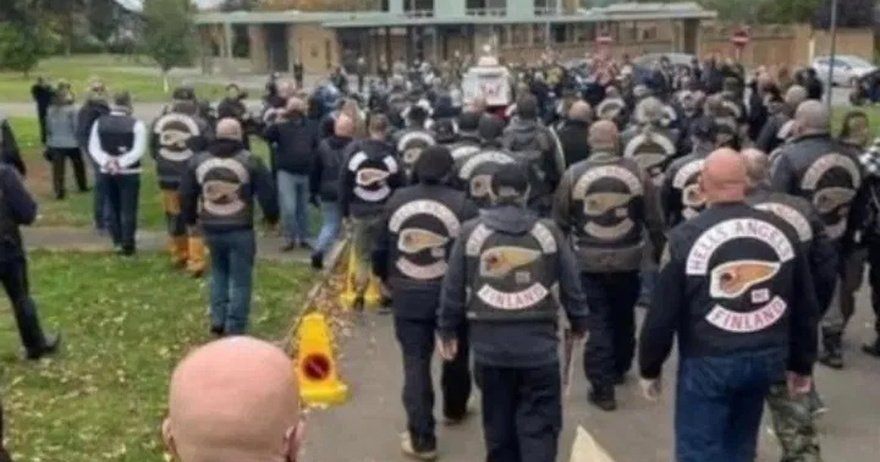Crying never came naturally to me.
Decades working as a high school janitor had taught me to keep my emotions buried. But when the first Harley rolled into the cemetery, followed by another and then dozens more, the earth practically trembled beneath the roar—and that’s when the tears finally came.
My 14-year-old son, Mikey, took his life in our garage. His suicide note named four classmates. “I can’t do this anymore, Dad,” he wrote. “They tell me to kill myself every day. Now they’ll get what they wanted.”
I felt useless. I hadn’t been able to protect him, not in life, and not in d3ath.
Then Sam came to our door. Towering, leather-clad, with a long gray beard, he was a familiar face—we’d seen him pumping gas at the station we’d visit after Mikey’s therapy sessions. He handed me a folded slip of paper with a phone number. “If you want us there,” he said, “we’ll come. Just for presence, not trouble.”
At first, I didn’t call. But the night before the funeral, I found Mikey’s journal, hidden under his mattress. Page after page described brutal bullying—cruel messages, public humiliation, stolen lunches, shattered self-worth. His pain was spelled out clearly. My hands trembled as I dialed.
“We’ll be there at nine,” Sam said. “You won’t need to worry about anything.”
The next morning, they came. Dozens of bikers in leather vests, solemn and silent. They stood in two lines by the chapel, forming a shield of support. When the four boys named in Mikey’s note arrived with their parents, confusion gave way to fear.
Weeks earlier, I had seen Mikey withdrawing, less talkative, quieter than usual.
He stopped inviting friends over, and bruises began to appear. Ms. Abernathy, the school librarian, told me he’d been eating lunch in the library every day. “I think he’s hiding,” she said. A week later, I found his sketchbook soaked and ruined in the trash.
When I brought concerns to the principal, he dismissed them. “Without clear reports, there’s not much I can do,” he’d said.
Then I found Mikey’s final message, taped under his desk drawer. “They say the world would be better without me. I can’t take it anymore.” He named the four boys—Jason, Tyler, Drew, and Marcus—athletes and sons of the town’s elite.
The next day, I didn’t go to work. I sat in Mikey’s room, staring at his model airplanes. That’s when I found the journal and a folder of screenshots—proof of the cruelty he endured.
I called Sam.
At the funeral, one of the boys’ fathers approached me, upset by the bikers’ presence.
“This is inappropriate. My son’s upset,” he said.
“So he should be,” I told him.
After the service, Sam gave me a card. “Next week we’re speaking at Mikey’s school. Those boys will be in the front row.”
When I got a call from the principal the following Monday, he said there were 50 bikers outside demanding to address the students about bu.llying. I gave him a choice: let them speak, or I’d release Mikey’s journal to the media.
He agreed.
In the auditorium, the students sat wide-eyed as the bikers spoke about bullying, suicide, and loss. Sam told Mikey’s story. Others shared their own. A woman named Angel talked about her daughter, Emma, who took her life at sixteen after relentless online harassment.
One by one, students began to speak up. Some admitted they’d known Mikey was suffering but had stayed silent out of fear. Tears flowed. Realizations set in.
Afterward, the four boys tried to slip away, but Sam stopped them.
“We’ll be watching,” he said.
The story made headlines. The bikers’ visit became a catalyst. Anti-bullying programs were adopted in nearby school districts. Principal Davidson resigned. A new principal implemented real change.
I left my job. I couldn’t clean the halls where Mikey had suffered. I sold our home and created a scholarship in his name for young artists.
Sometimes I ride with the Steel Angels now. Sam taught me. I’m not a natural biker, but I show up for funerals, for grieving families, for kids like Mikey. At a recent funeral, a father asked, “You’re here for my son?” I nodded. “We all are.”
When thunder rumbles now, I think of Mikey. I think of all the children who needed someone to listen. We can’t bring them back—but maybe, with enough noise, we can save the next one.
And that’s something worth riding for.
TikTok star dies at 24 after extreme eating videos
Optical Illusion Challenge: How Many Faces Can You Spot in This Mind-Bending Image?
Cassie Details Freak Offs in Testimony During Diddy Trial: ‘Eventually It Became a Job for Me’
Elon Musk’s brutal response to Bill Gates after he claimed he was ‘killing children’
